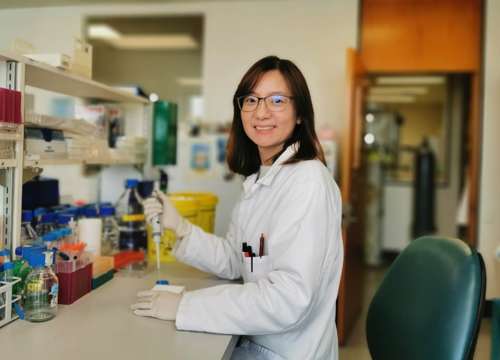Population-specific genetic variants that alter responses to diabetes medication
A MWC programme of work around a SLC22A3 gene variant unique to Māori and Pacific peoples that could impact the way first line drug treatment is managed for people with type 2 diabetes is advancing to human clinical trials – and is showcasing the most complete proof of principle of MWC’s integrated and network approach to address health inequities.

Dr Qian (Claire) Wang
MWC Deputy Director Professor Peter Shepherd and Affiliate Investigator Dr Qian (Claire) Wang (University of Auckland) are embarking on co-designed human clinical trials to understand the impact of the rs8187715 variant in the SLC22A3 gene on metformin bio-efficacy. Metformin is the first-line treatment for type 2 diabetes and is known to be transported by SLC22A3.
In 2023, Dr Wang developed a mouse model of the rs8187715 variant to look at the impacts on metformin as it was absorbed, distributed and eliminated from the body, and subsequent effects on insulin sensitivity in vivo.
She found that the rs8187715 variant increased the uptake and disposal of metformin in animal models, and promoted insulin sensitivity within an acute dose model. Surprisingly, however, longer-term metformin treatment was less effective in variant knock-in animals regardless of whether they were fed with normal or high fat diets, presumably because it was being metabolised faster. They are now looking at whether similar changes occur in people carrying this variant.
Their short-term metformin pharmacokinetics study will now be complemented by a parallel study led by clinicians and community organisations examining how the variant affects real-world metformin efficacy for people with prediabetes and type 2 diabetes. In other words, do the 15% of Māori and Pacific people in New Zealand who carry this particular variant (which is very rare in other people) show reduced responses to metformin, and therefore would benefit by more rapidly moving to another class of medication?
Dr Wang says if the variant shows a similar impact on the clinical response to metformin treatment in people as it did in the mouse models, it may be an ancestral-specific genetic biomarker that can be used to guide precision medicine strategies of metformin treatment in type 2 diabetes.
Prof Shepherd says the SLC22A3 clinical trials are the next step in the integrated genetics-fundamental biology-community approach taken by the MWC Metabolic Health theme. “This work is the best and most complete example of the power of looking at Polynesian-specific variants in genes and using the skills across the MWC network to evaluate function of these genes to generate information that can be used for good clinical outcomes.”
The rs8187715 variant of the SLC22A3 gene is only one of over 2000 genetic variants relating to Māori and Pacific peoples which have been identified by MWC researchers. While not all the variants will have potential for clinical impact, many could benefit human health and advance global work in precision medicine.
Prof Shepherd and Dr Wang shared their findings on the SLC22A3 gene variant in poster and presentation sessions at the “The Role of Ethnic Diversity in Precision Medicine’ 2024 Keystone symposium in Vancouver Canada where they spoke with other experts on the importance of working with ethnic groups with unique genetic profiles to develop precision medicine strategies.
The findings are now published in the high-profile journal Diabetologia1 and highlighted as an “up-front” selection by the editor.
The diverse author list alone shows the power of the MWC network in bringing together skills of geneticists, fundamental biologists, clinicians, and community researchers.
1 The population-specific Thr44MetOCT3 coding variant affects metformin pharmokinetics with subsequent effects on insulin sensitivity in C57BI/6J Mice https://link.springer.com/article/10.1007/s00125-024-06287-1.